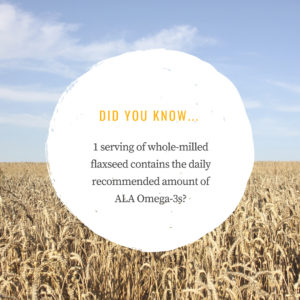The Skinny on Fat – What You Should Know
There are three main types of fat: unsaturated, saturated, and trans. Some types of fats help to ease inflammation and improve long term health, while others can increase cholesterol and the risk for chronic diseases.
Below you’ll find everything you need to know to help you make educated decisions when it comes to your diet. See how flaxseed compares in each category!
Saturated Fat
Saturated fats are solid at room temperature and are found in meat (particularly fatty cuts of beef), dairy, butter, coconut oil, and baked goods. Replacing saturated fats in your diet with unsaturated fats has been shown to reduce the risk for heart disease. However, eliminating saturated fat alone may not have the same health benefits. Speak with your registered dietitian to learn more about this.
Manitoba Milling Co. Smooth Whole-Milled Flaxseed contains 0.5 grams of saturated fat per serving.
Unsaturated Fat
Unsaturated fats, both polyunsaturated and monounsaturated, are liquid at room temperature. You can find them in nuts, seeds, avocados, and olive oil. Unsaturated fats help to ease inflammation and improve your cholesterol profile.
Manitoba Milling Co. Smooth Whole-Milled Flaxseed contains 5.5 grams of unsaturated fat per serving.
Trans Fat
Some trans fats are found naturally in very small amounts in foods such as meat and dairy. Most of the trans fat we get in our diets are artificially made through a chemical process called hydrogenation. This process makes a liquid oil solid at room temperature. Partially hydrogenated oils and deep fried foods (baked goods, packaged foods, french fries, donuts) have been the primary source of trans fatty acids in our diets.
For the past 100 years, artificial trans fats, in the form of hydrogenated oils, have been added to packaged foods to increase their shelf-life. However, as of June 2018, the FDA now prohibits food manufacturers from using partially hydrogenated in their products. Artificial trans fats have been extensively linked to heart disease, diabetes, and stroke (read more here). You may still find trans fats in foods over the next few months as companies have been given time to comply.
Trans fats have been shown to increase LDL (‘bad’) cholesterol and lower HDL (‘good’) cholesterol, and increase your risk for heart disease, stroke, and type 2 diabetes. The only way to know if there is trans fat in your foods is to read the ingredients list and look for hydrogenated oils. Food manufacturers can list 0 grams, if there is up to 0.5 grams of trans fat per serving.
Manitoba Milling Co. Smooth Whole-Milled Flaxseed contains 0 grams of trans fat per serving.

Omega-3s
Omega-3s are a type of polyunsaturated fat that are essential, meaning your body cannot produce them on it’s own and they must be obtained through your diet. Omega-3s are anti-inflammatory and beneficial to your heart health, eye health, brain health, and more. They improve joint pain from arthritis and contribute to lower levels of depression.
There are three types of Omega-3s: ALA, DHA, and EPA. EPA and DHA are found in fish and seafood. ALA is found primarily in flaxseed, walnuts, canola oil, and soybean oils.
Flaxseed is the best plant-based source of ALA omega-3s. The Institute of Medicine recommends women consume an average of 1.1 grams of ALA Omega-3s per day and men consume 1.6 grams of ALA per day.
One serving of Manitoba Milling Co. Smooth Whole-Milled Flaxseed contains 3.45 grams of ALA Omega-3s.
Learn more about Omega-3s in our blog post here.


